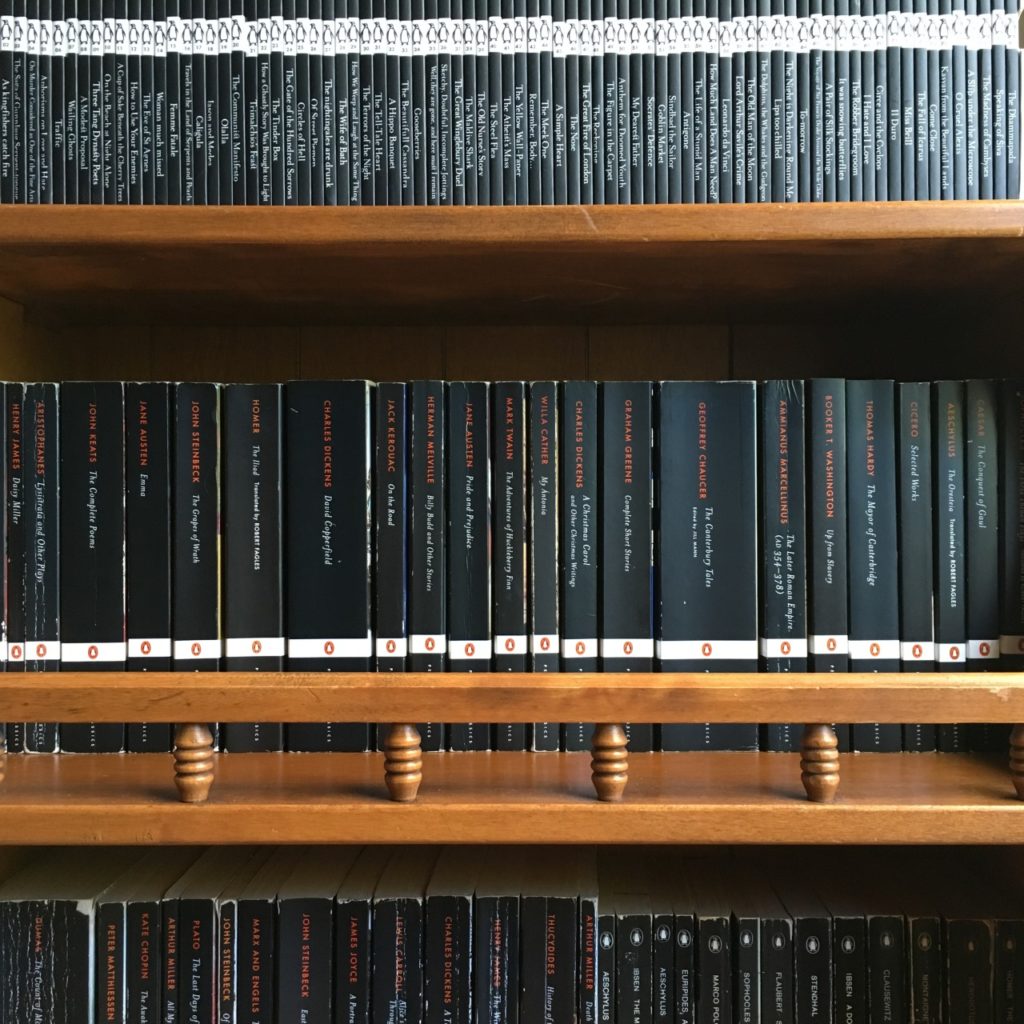Passing by Nella Larsen
After my disappointment in The Vanishing Half, a kind Book Barmy follower sent me a note and suggested I try the classic, Passing by Nella Larsen. He went on to say it was a much better book, and an important one at that. A insightful story of racial identity and its falsehoods.
That was more than a year ago and although I made a note, it slipped my mind (like many things these past couple of years).
Fast forward to present day and while looking through my shelves for another book, I came across a copy of Passing which I forgot I had.
You see, I have a fondness for this Penguin Classics series and their lovely black spines…but trust me I don’t have as many as pictured here from the library of this blogger. I do have a small stack amongst my books and they are important reads (which I tell myself I should be reading) and most quite slim.
When I saw that Netflix was airing a film based on the book, I decided I must read it before watching the film. With that motivation, I finished Passing in just two evenings (and late into one night), and I’m grateful for the excellent tip from a reader – this was a riveting and thought-provoking novella.
But first a little author background (apologies, if you don’t know this by now, I tend to geek out on the background of authors and the genesis of their writing).
Nella Larson (1891-1964) was born in Chicago to mixed race parents. A Danish mother and her father, also with a mixed race heritage, was Afro-Caribbean. Ms. Larson was caught in between worlds, not quite white, not quite black, so it was natural for her to write of her life experiences. And that’s what she does in Passing.
The story is set in Harlem and revolves around two women, Irene Redfield and Clare Kendry, both light skinned, one secure and happy. Irene accepts her racial identity, while Clare is passing as a white woman and is burdened with all the insecurities her secret causes. Clare married a white, racist man and she lives in a society that would reject her if they knew the truth.
Ms. Larsen takes her readers back to the Harlem Renaissance when African Americans were beginning to come into their own in northern society. It’s also fascinating look at two black women living a glamorous lifestyle in the 1920s.
The trouble with Clare was, not only that she wanted to have her cake and eat it too, but that she wanted to nibble at the cakes of other folk as well.
I found Passing beautifully written and Ms. Larsen’s characters are developed with such visual clarity and verbal accuracy that they dominate the novel. These characters have very different and often astonishing perceptions of racial identity.
It’s funny about passing. We disapprove of it and at the same time condone it. It excites our contempt and yet we rather admire it. We shy away from it with an odd kind of revulsion, but we protect it.
I don’t want to give too much away but there are number of subtexts in the book; the complex relationship between Clare and Irene, repressed homosexual desire, and emotional abuse. Ms. Larsen controls all these stories perfectly; she reveals plot points at exactly the right time and lets the characters drive the narrative.
When it comes to the end, don’t be frustrated – the author lets the reader decide the future. So just give it a good think.
I highly recommend this slim novella – and its examination of the various ways in which everyone is ‘passing’. While written in 1929, it couldn’t be more timely and relevant.
Passing – The Film:
The Netflix film was beautiful and received excellent reviews. Shot entirely in black and white, I found it a fine adaptation of the book. The setting and clothes are stunning. And oh the hats – the hats!
Well worth watching, but please, only after you’ve read the book.
N.B. Another geeky note: Nella Larsen holds her own place in history for being the first African-American woman to receive a Guggenheim fellowship,







